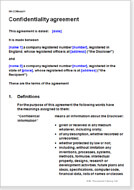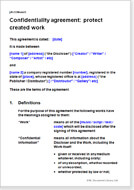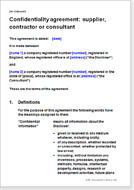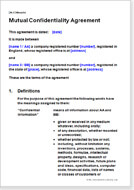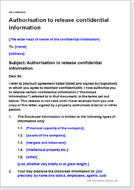Confidentiality agreements are absolutely essential to most businesses. The ones we provide both serve as a reminder to an employee or consultant to respect the privacy of the organisation, and as a legally binding supplementary contract against which action can be brought. Our confidentiality agreements are suitable when you want to protect data, processes and ideas.
Confidentiality agreements
Confidentiality agreement
This confidentiality agreement (non-disclosure agreement or NDA) enables a business or individual to explore the possibilities for a deal before signing an agreement that covers the terms. This confidentiality agreement is a good way of protecting your secrets from being used by the other side if the deal doesn't go ahead. Examples of use might be: a proposed franchise; a business acquisition; the appointment of an agent or distributor; demonstration of a plans, ideas or a prototype.
Confidentiality agreement: protect created work
This confidentiality agreement (non-disclosure agreement or NDA) should be used by a creator of a piece of work (whether a work of art, a book, film, idea, software code or other intellectual property) to prevent another party from using ideas within the work without the creator's permission. It will allow the creator to explore development, manufacture, use or sale of the piece of work together with the other party.
Confidentiality agreement: supplier; contractor or consultant
This confidentiality agreement (non-disclosure agreement or NDA) is for use where a supplier may find out sensitive information in the course of providing the goods or services. Learning the information may be necessary for the task, or you may just be concerned that private information might be disclosed inadvertently. Using this agreement is also an excellent way to remind suppliers of their responsibilities to maintain client confidentiality.
Mutual confidentiality agreement
This mutual confidentiality agreement (sometimes called a non-disclosure agreement or NDA) enables parties to explore the possibilities for a deal before signing an agreement that covers the terms. Being a mutual agreement, both sides agree to the same terms of disclosure, but not necessarily the disclosure of the same information. This confidentiality agreement is a good way of protecting your secrets from being used by the other side if the deal doesn't go ahead. Examples of use might be: sub-contract manufacture; business acquisition; joint product development.
Authorisation to release confidential information
This authorisation letter lets you specify exactly who is entitled to receive your confidential information other than the person with whom you have made signed a confidentialityagreement. Use it to protect your interests.

If the document isn’t right for your circumstances for any reason, just tell us and we’ll refund you in full immediately.

We avoid legal terminology unless necessary. Plain English makes our documents easy to understand, easy to edit and more likely to be accepted.

You don’t need legal knowledge to use our documents. We explain what to edit and how in the guidance notes included at the end of the document.

Email us with questions about editing your document. Use our Lawyer Assist service if you’d like our legal team to check your document will do as you intend.

Our documents comply with the latest relevant law. Our lawyers regularly review how new law affects each document in our library.
All rights reserved

